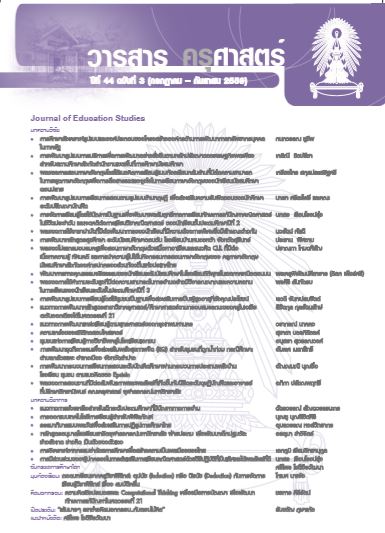แนวทางการพัฒนาแหล่งเรียนรู้ตามยุทธศาสตร์ของกรุงเทพมหานคร Guidelines for the Development of Learning Centers in Accordance with the Bangkok Metropolitan Administration Strategy
Keywords:
แหล่งเรียนรู้, กรุงเทพมหานคร, LEARNING CENTERS, BANGKOK METROPOLITANAbstract
การวิจัยครั้งนี้มีวัตถุประสงค์ 1) เพื่อวิเคราะห์แนวทางการพัฒนาแหล่งเรียนรู้ของเมืองแห่งการเรียนรู้ในต่างประเทศ 2) เพื่อวิเคราะห์สภาพปัจจุบัน ปัญหาและความต้องการที่เกี่ยวข้องกับแหล่งเรียนรู้ตามยุทธศาสตร์ของกรุงเทพมหานคร และ 3) เพื่อนำเสนอแนวทางการพัฒนาแหล่งเรียนรู้ตามยุทธศาสตร์ของกรุงเทพมหานคร ใช้การวิจัยเอกสารเพื่อวิเคราะห์เมืองแห่งการเรียนรู้ 16 เมือง ในสหราชอาณาจักร ออสเตรเลีย แคนาดา สาธารณรัฐฟินแลนด์ และสาธารณรัฐเกาหลี และใช้การวิจัยเชิงสำรวจ โดยได้แบบสอบถามคืนจากผู้ให้บริการแหล่งเรียนรู้ 248 ชุด และจากผู้ใช้บริการ 709 ชุด วิเคราะห์ข้อมูลโดยการหาค่าร้อยละ ค่าเฉลี่ยและส่วนเบี่ยงเบนมาตรฐาน อีกทั้งศึกษาภาคสนามในชุมชน 5 ประเภทคือ เคหะชุมชน ชุมชนหมู่บ้านจัดสรร ชุมชนชานเมือง ชุมชนเมือง และชุมชนแออัด โดยการสัมภาษณ์เชิงลึกและการสนทนากลุ่ม และตรวจสอบร่างแนวทางการพัฒนาแหล่งเรียนรู้โดยผู้ทรงคุณวุฒิ 8 คน ผลการวิจัยพบว่า ในต่างประเทศมีการกำหนดนโยบายเมืองแห่งการเรียนรู้โดยมีการพัฒนานวัตกรรมด้านยุทธศาสตร์ที่จะเอื้อให้ ทุกคนได้เรียนรู้ได้ตลอดชีวิต มีการนำเทคโนโลยีสารสนเทศมาใช้อย่างกว้างขวาง จัดโครงการและกิจกรรมที่หลากหลาย และเน้นการทำงานแบบมีส่วนร่วมกับชุมชน ส่วนกรุงเทพมหานครมีการกำหนดนโยบาย ยุทธศาสตร์ โครงการและกิจกรรมที่เกี่ยวข้อง แต่ชุมชนยังไม่เข้าใจยุทธศาสตร์นั้น การดำเนินการมีปัญหาระดับมากในด้านเจ้าหน้าที่ สื่อวัสดุ อุปกรณ์ในการเรียนรู้ และโครงสร้างพื้นฐานต่างๆ ส่วนกิจกรรมที่จัดยังไม่สอดคล้องกับความต้องการของชุมชน ดังนั้น ภาครัฐ ภาคเอกชนและชุมชนจำเป็นต้องเข้าใจเป้าหมายและเข้ามามีส่วนร่วม รวมทั้งต้องลงทุนด้านโครงสร้างพื้นฐานที่พอเพียง พัฒนาบุคลากร นวัตกรรมในแหล่งเรียนรู้และกิจกรรมการเรียนรู้ที่จะทำให้เข้าถึงกลุ่มเป้าหมายต่างๆ ตามที่กำหนดไว้
This research aimed to (1) analyze the guidelines for developing learning centers in the learning cities in foreign countries; (2) analyze the present state, problems, and needs relating to learning centers in the Bangkok metropolis; and (3) propose guidelines for the development of learning centers in accordance with the strategy of the Bangkok Metropolitan Administration (BMA). Document research was used to analyze 16 learning cities in the United Kingdom, Australia, Canada, Republic of Finland, and Republic of Korea. A survey research was administered in the Bangkok metropolis, using questionnaires for providers and users of learning centers. Data was then collected from 248 providers (86.71%) and 709 users (78.77%) and was analyzed by percentage, means and standard deviation. Field research, by means of in-depth interviews and focus group discussion, was also undertaken in 5 types of community: community housing, housing project community, suburban community, urban community, and slum areas. The proposed guidelines for the development of learning centers in accordance with the strategy of BMA were examined by experts. It was found that communities had announced policies which envisioned their cities as becoming learning cities and encouraged innovative strategies that allowed their citizens to learn new skills and competencies throughout life. Information technology (IT) was widely used in most of the learning cities. A variety of innovative projects and activities were carefully added and participation from community members was encouraged. In Bangkok the findings showed that even though BMA had launched their policy and strategies relating to learning cities and learning centers, community members still did not quite have a clear understanding about them. Both providers and users of learning centers agreed that there were highly problematic issues and obstructions regarding personnel, learning media, and other infrastructure. Moreover, most of the provided activities were not relevant to the needs of community members. In order to develop learning centers, the BMA should seek ways to build mutual understanding and strong commitment among the government sector, community, and related stakeholders; provide sufficient investment for infrastructure; support personnel development; and facilitate innovations in learning centers and activities that will attract various target groups.



